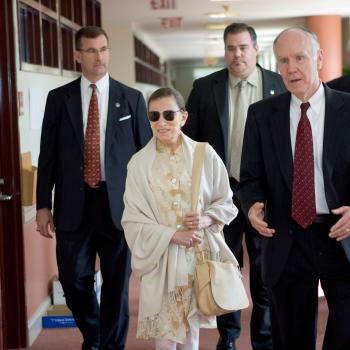A few years back, I attended a sermon by Reverend Mark Stringer, a Unitarian Universalist minister who later became the Executive Director of the Iowa ACLU. He was talking about community organizing. More specifically, he was talking about the tendency of those who identify as “progressive” to apply political/theological litmus tests, and refuse to ally themselves with anyone who fails.
This was before “cancel culture” and the Facebook “unfriend me now” fad we’ve all since come to know, but even back then, Rev. Stringer had plenty of examples to offer. The sermon started off with a bit of banter and humor about our deep desire to argue every issue with every wrong person we encounter, and then, just as we were settling in and getting comfortable in our theological seats, Stringer leaned his tall frame way out over the podium—far enough I could swear the whole room fell suddenly in his shadow—and asked us all, “how’s that working out for you?”
Jesus and the Pharisees
Some of my favorite words in the Gospel tradition come at the beginning of Luke, Chapter 14, where Luke records, “on one occasion when Jesus was going to the house of a leader of the Pharisees to eat a meal on the sabbath…”
On one occasion.
We know that Jesus knew his crucifixion was coming at the hands of the Pharisees and other Jewish leaders. We knew that Jesus had a running theological battle with the Pharisees throughout the Gospels. But even knowing how wrong the Pharisees were on so many issues and how badly they would abuse him in the days to come, Jesus commanded his followers to respect the authority of Moses’ seat on which the Pharisees sat, and he himself sat at their table, again and again throughout the entire story.
Of course, Jesus did argue with the Pharisees from time to time, but nothing changed. I doubt he intended it to. Those moments in the Gospel seemed geared more toward the onlookers than the Pharisees. What does create change in the Christian story is when Jesus continues to show up and do the work he was born to do.
John speaks of Nicodemus the Pharisee seeing Jesus’ work and being so impressed that he comes by night to see him. After their interaction, Nicodemus is a changed man, and becomes Jesus’ advocate among his colleagues. Paul, too, was a Pharisee famous for persecuting Christians, but eventually sees Jesus in a (literal or figurative) flash of light so bright it temporarily blinds him, and he becomes the early church’s chief evangelist.
But What About Us?
I think the reason I felt the Rev. Stringer’s shadow weigh so heavily on me that long ago Sunday morning is that I was, and am, guilty of exactly what he charged. I want to “cancel” every politician of any party who has ever shown themselves to be racist, or homophobic, or xenophobic, or misogynist. I want to unfriend any church that will not allow LGBTQ+ ministers and congregants the same rights as anyone else. I want to rage against every right-wing troll on the Internet. I want my litmus tests to stick.
So how’s that working out for me?
So far, I have made very little change in the world by arguing. Where I have managed to do good, it has always been by showing up and putting in the work needed to make the world a better place. I sit on the boards of ecumenical charities with churches I could never see eye to eye with theologically. I work side by side with people who advocate against the basic human rights of people I love. Even this blog, The New Paraclete, sits on the Patheos platform, which is dedicated to diverse and often divergent voices coming together in one public forum to speak their truths. Where we find common ground, we work together. Where we don’t, we don’t. Does this make me less of a progressive? Maybe. Does this make me more of a Christian? Well, if you define Christianity as following in the footsteps of Christ, it can’t hurt to learn from his example…
Moving Forward
There is an election coming. There is a pandemic on. People are protesting in the streets. The Internet still exists. Sometimes, like Christ, I know it is right to argue or protest or demonstrate. I know there are people watching who need to see that someone will stand up for them. But at the same time, I know that my angry voice is not going to change any minds on the other side. Do I want to be a prophet, or a peacemaker? Like anything else in life, there’s a balance to be found. I haven’t found it yet, but I know it’s there, waiting for me, if only I can keep showing up long enough.
In the meantime, if you can read this, you are welcome at my table. Please forgive me when I bristle at the things you say, and please keep saying them. The only way out of this mess we’re in is through, and the only way we’re going to get there is to keep talking like one big, messy, loving human family.













